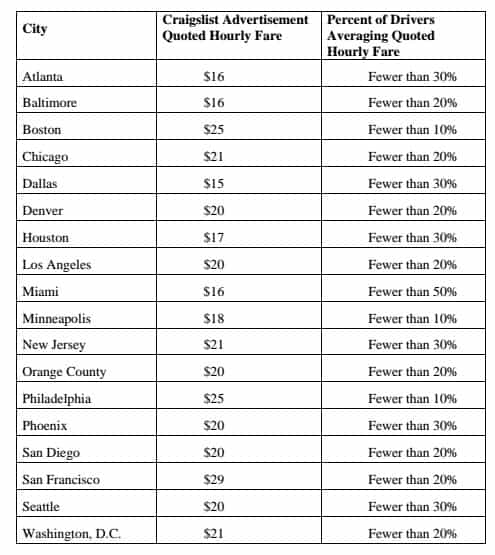 Uber has agreed to pay $20 million to resolve Federal Trade Commission charges that it misled prospective drivers with exaggerated earning claims and claims about financing through its Vehicle Solutions Program. The $20 million will be used to provide refunds to affected drivers across the country. Advertised rates were made fewer than 10-30% of drivers in most major cities in the United States except for Miami. The rate for San Francisco at $29 hour is made by were than 20%.
Uber has agreed to pay $20 million to resolve Federal Trade Commission charges that it misled prospective drivers with exaggerated earning claims and claims about financing through its Vehicle Solutions Program. The $20 million will be used to provide refunds to affected drivers across the country. Advertised rates were made fewer than 10-30% of drivers in most major cities in the United States except for Miami. The rate for San Francisco at $29 hour is made by were than 20%.
Uber continues to pursue self-driving even after its debacle in San Francisco. Today, Amit Singhal joined Uber as Senior Vice President of Engineering after working at Google for 15 years. Uber recently added the feature that allows users to request a Uber ride directly from the Google Maps app.
“Many consumers sign up to drive for Uber, but they shouldn’t be taken for a ride about their earnings potential or the cost of financing a car through Uber,” said Jessica Rich, Director of the FTC’s Bureau of Consumer Protection. “This settlement will put millions of dollars back in Uber drivers’ pockets.”
According to the FTC’s complaint, in its efforts to attract prospective drivers, Uber exaggerated the yearly and hourly income drivers could make in certain cities, and misled prospective drivers about the terms of its vehicle financing options.
The FTC alleges that Uber claimed on its website that uberX drivers’ annual median income was more than $90,000 in New York and over $74,000 in San Francisco. The FTC alleges, however, that drivers’ annual median income was actually $61,000 in New York and $53,000 in San Francisco. In all, less than 10 percent of all drivers in those cities earned the yearly income Uber touted. The FTC also alleges that Uber made high hourly earnings claims in job listings, including on Craigslist, but that the typical Uber driver failed to earn those advertised hourly amounts in various cities.
The complaint also alleges that Uber claimed its Vehicle Solutions Program would provide drivers with the “best financing options available,” regardless of the driver’s credit history, and told consumers they could “own a car for as little as $20/day” ($140/week) or lease a car with “payments as low as $17 per day” ($119/week), and “starting at $119/week.” Despite Uber’s claims, from at least late 2013 through April 2015, the median weekly purchase and lease payments exceeded $160 and $200, respectively, the FTC alleges. Uber failed to control or monitor the terms and conditions of the auto financing agreements through its program and in fact, its drivers received worse rates on average than consumers with similar credit scores typically would obtain, according to the FTC’s complaint. In addition, Uber claimed its drivers could receive leases with unlimited mileage through its program when in fact, the leases came with mileage limits, the FTC alleges.
In addition to imposing a $20 million judgment against Uber, the stipulated order prohibits the company from misrepresenting drivers’ earnings and auto finance and lease terms. The order also bars Uber from making false, misleading, or unsubstantiated representations about drivers’ income; programs offering or advertising vehicles or vehicle financing or leasing; and the terms and conditions of any vehicle financing or leasing.
The Commission vote authorizing the staff to file the complaint and proposed stipulated order was 2-1. Commissioner Maureen K. Ohlhausen dissented and issued a statement. The documents were filed in the U.S. District Court for the Northern District of California.
Please you spleechecker. Lol